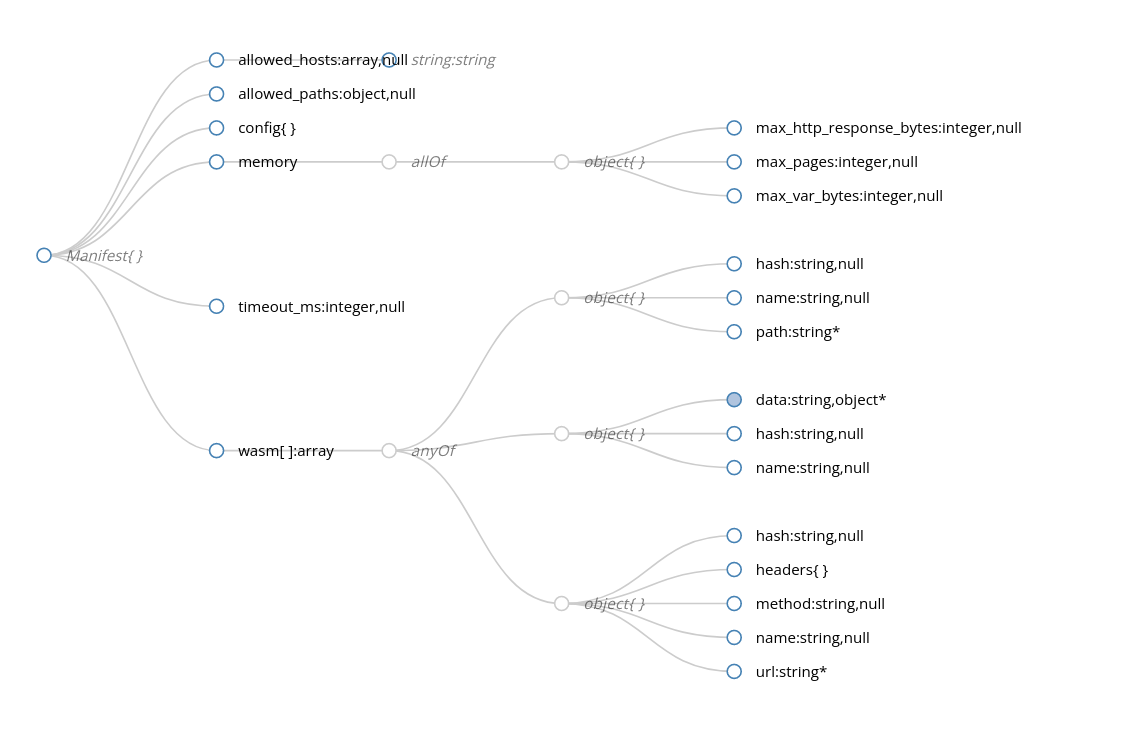The Manifest
The manifest is a description of your plugin and some of the runtime constraints to apply to it. You can think of it as a blueprint to build your plugin.
wasm = open("../wasm/code.wasm", 'rb').read()
wasm_hash = hashlib.sha256(wasm).hexdigest()
manifest = {
"wasm": [
{
"data": wasm,
"hash": wasm_hash
}
],
"memory": {
"max_pages": 5
}
}
plugin = context.plugin(manifest)
Schema
schema.py
{
# The "wasm" key describes the wasm code needed to build the plugin.
# There are a few ways to load wasm code:
"wasm": [
# you can point to a file:
{
# a file path for a plugin on disk
"path": "./code/myplugin.wasm",
# an optional name
"name": "main",
# the optional sha256 hash in hex form (it's optional, but recommended)
"hash": "15c66d72f683e0225c774134b42ba6e04275a7a56b0a522af538d029650f15a8",
},
# or, you can pass raw binary data for the code already in memory:
{
# the base64-encoded raw bytes of the wasm module
"data": open("../wasm/code.wasm", 'rb').read(),
# an optional name
"name": "main",
# the optional sha256 hash in hex form (it's optional, but recommended)
"hash": "15c66d72f683e0225c774134b42ba6e04275a7a56b0a522af538d029650f15a8",
},
# or, you can load a remote resource with a URL:
{
# a URL to some wasm code
"url": "https://example.com/mycode.wasm",
# optional headers you may need to get the data, e.g. auth headers
"headers": {
"X-API-KEY": "34b42ba6e04275",
"User-Agent": "extism",
},
# optional HTTP method to use, (default: GET)
"method": "GET",
# an optional name
"name": "main",
# the optional sha256 hash in hex form (it's optional, but recommended)
"hash": "15c66d72f683e0225c774134b42ba6e04275a7a56b0a522af538d029650f15a8",
},
]
# Describes the limits on the memory the plugin may be allocated.
"memory": {
# The max amount of pages the plugin can allocate
# One page is 64Kib. e.g. 16 pages would require 1MiB.
"max_pages": 4,
# The max size of an Extism HTTP response in bytes
"max_http_response_bytes": 4096,
# The max size of all Extism vars in bytes
"max_var_bytes": 4096
},
# An optional set of hosts this plugin can communicate with.
# This only has an effect if the plugin makes HTTP requests.
# Note: if left empty then no hosts are allowed and if `null` then all hosts are allowed.
"allowed_hosts": [
"example.com",
"extism.org",
],
# An optional set of mappings between the host's filesystem and the paths a plugin can access.
# This only has an effect if the plugin is provided with WASI capabilities.
# Note: if left empty or `null`, then no file access is granted.
"allowed_paths": {
"/path/on/disk": "plugin/path",
"another/path": "/",
},
# The "config" key is a free-form map that can be passed to the plugin.
# A plugin author must know the arbitrary data this map may contain, so your own documentation should include some information about the "config" passed in.
"config": {
"mykey": "myvalue"
}
}
Validating the Manifest
If needed, we maintain an exported JSON schema for the manifest which you can find here.

 👈 🆕
👈 🆕